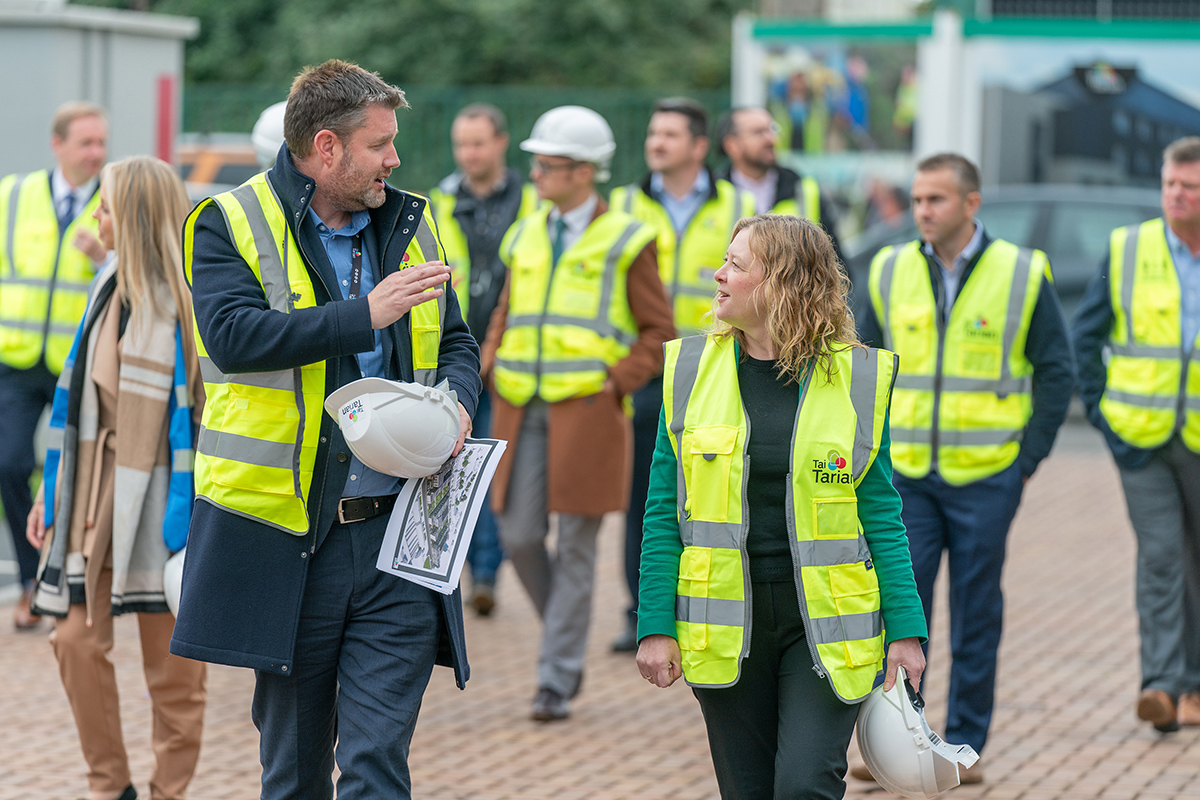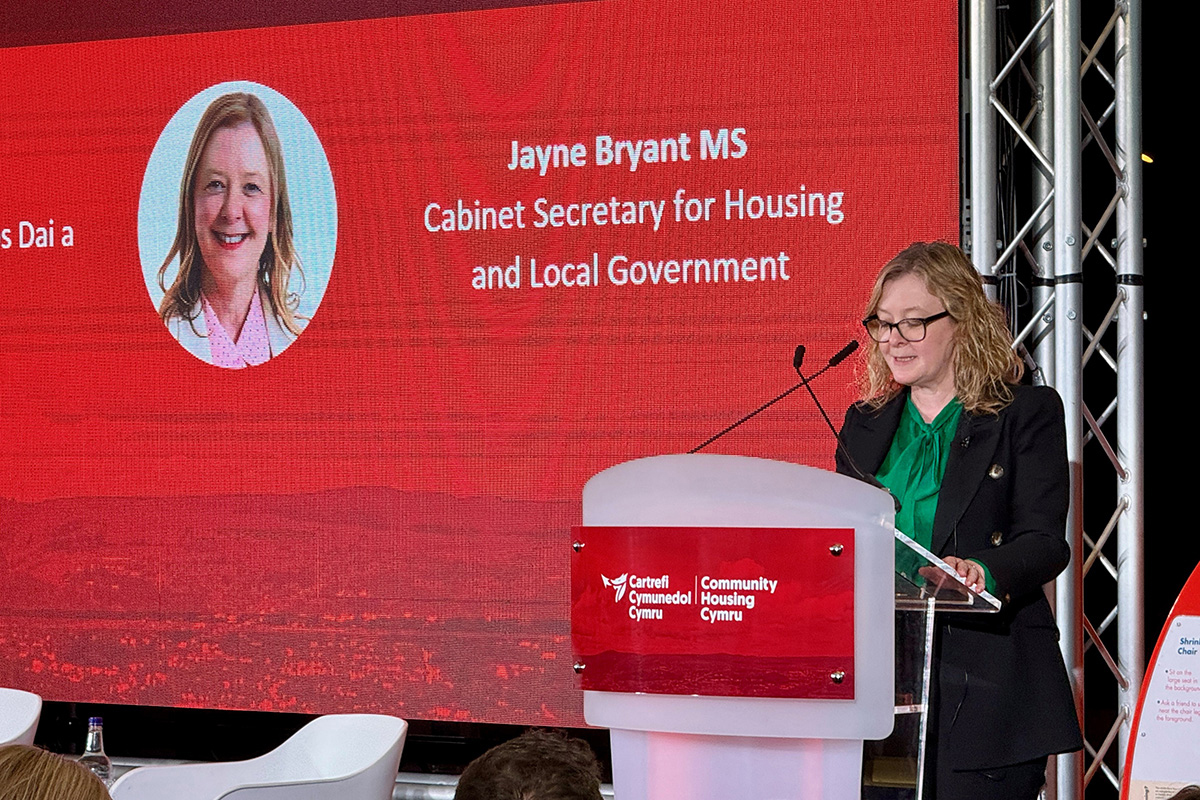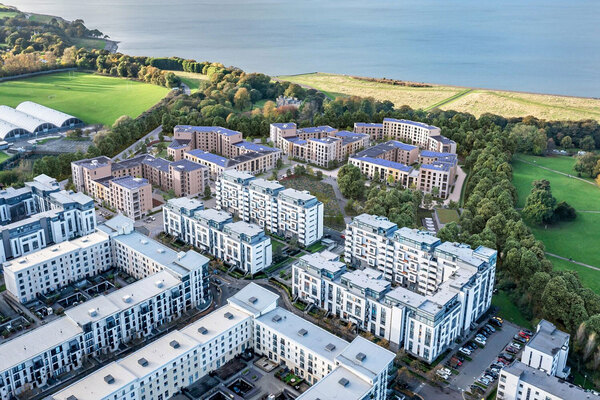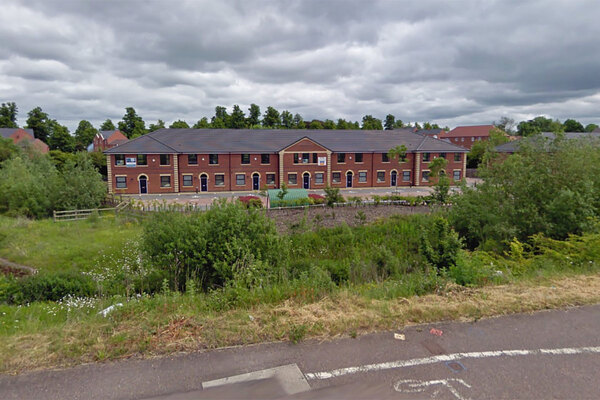Meet the new Welsh housing secretary
Last year, Jayne Bryant became Wales’ new housing secretary. She tells Jenny Messenger how she plans to deliver on some tough targets ahead of the Senedd election in 2026

Welsh housing and local government secretary Jayne Bryant has been on a mission to visit as many stakeholders in the housing sector as she can since she took on the role in July.
She is speaking to me over Teams, with an array of housing schemes to visit on the desk in front of her. Later, she will be heading to see a brownfield site on a Cardiff high street, where Taff Housing Association is building 10 new low-carbon flats.
“I’m really glad that I’ve got housing in my portfolio. I think there are so many opportunities,” Ms Bryant says.
But she is also taking on substantial challenges. With the housing brief, Ms Bryant has inherited the Welsh government’s target of delivering 20,000 low-carbon homes for social rent, as well as the introduction of new homelessness legislation and a building safety bill – all before the next Senedd election in May 2026.
These are big asks. The question is: how is Ms Bryant going to get this done in the remaining 18 months?
She is only the second housing secretary since 2018 – an aeon by comparison with recent practice in England. Labour has been the party of government in Wales in one form or another since the country gained independence in 2000.
But the Welsh government has had an unsettled year. Mark Drakeford stepped down as first minister in March and was replaced by Vaughan Gething, who led the nation for six months.
Mr Gething then stood down after it was revealed he had deleted messages from his phone – despite telling the COVID-19 Inquiry he had not – and several members of his cabinet resigned over a lack of confidence in his leadership.
Eluned Morgan, the former cabinet secretary for health and social care, became first minister in August.
Could the turmoil risk slowing down housing delivery? Ms Bryant thinks not. “For us, it’s about getting on with the job. We know what we’ve got to do,” she states. “I don’t think anything has been delayed through the change of first minister.”
Government officials have been continuing to work as normal, she adds. “It’s just that focus on delivery that the new first minister has given us. I think that has sharpened everybody’s minds.”
In 2016, Ms Bryant was elected as the Labour Senedd member for Newport West. She then chaired the Standards of Conduct Committee and became chair of the Children, Young People and Education Committee in 2021. In 2023, she led a report on reforming care services for children and young people, which recommended that people who experienced care should have the highest priority in housing allocation.
In March this year, Ms Bryant became minister for mental health and early years – her first ministerial post. Four months later, she was named the cabinet secretary for housing, local government and planning. Then in September, the planning brief was given to Rebecca Evans, who is also cabinet secretary for the economy and energy, and Ms Bryant became cabinet secretary for housing and local government.
So far, Ms Bryant says she has been impressed by the passion and ambition of the stakeholders she has met. But with such a huge challenge ahead, will that enthusiasm be enough?
New first minister Ms Morgan has been clear that she wants her government to make good on its pledges.
The previous housing secretary, Julie James, has been appointed to a newly created role of minister for delivery. So far, only 5,775 homes have been built, out of a target of 20,000. (The data for 2023-24 was due to be published as Inside Housing went to press.)
On 18 September, Ms Bryant made her first appearance in front of the Local Government and Housing Committee since becoming housing secretary. She had previously been a committee member, so whereas once she was asking the questions, now she has to answer them.
It was on the issue of delivery that committee members quizzed her. They questioned Ms Bryant on the target and brought up a report from Audit Wales which found that an extra £600m would be needed to deliver all 20,000 homes. Ms Bryant accepted the report’s recommendations – one of which is the need for a longer-term housing strategy – and said modelling how much it will cost to deliver the remaining homes is “very complicated” and “not a linear process”.
Jayne Bryant’s political career
2016: Elected as Labour member for Newport West
2016-2021: Chair, Standards of Conduct Committee
2017: Co-founded Purple Plaques, a scheme that recognises the achievements of women in Wales
2021: Re-elected as Senedd member for Newport West
2021-2024: Chair of the Children, Young People and Education Committee
2021-2024: Chair of cross-party groups on diabetes, preventing child sexual abuse, arts and health, and suicide prevention
2023: Co-chair, Vaughan Gething’s leadership campaign
March 2024: Minister for mental health and early years
July 2024-September 2024: Cabinet secretary for housing, local government and planning
September 2024-present: Cabinet secretary for housing and local government
During the committee session, Stuart Fitzgerald, deputy director of homes and places at the Welsh government, acknowledged that extra budget is needed to meet the target, although he added that the government would get as close as possible.
Ms Bryant’s tactic has been to zero in on any developments that can be sped up in time to meet the deadline, writing to councils and housing associations asking for details on stuck projects. “It’s really about trying to get an idea of anything that could be a problem that’s in the system already, but also asking what else we can add additionally to those numbers,” she explains.
While the Welsh government’s target initially stated the homes would be new build and low carbon, it has acknowledged it will count acquisitions, too. Potential routes to bulking up numbers include making use of Leasing Scheme Wales, which enables owners to lease residential properties to their local authority. Other options are to make extra acquisitions and prioritise social housing already in the planning system.
“I’ve asked that we’re really focused on this because I think this is where we can add some extra value,” Ms Bryant says, adding that she is “really looking for some ambition” from the sector.
I catch up with Ms Bryant again several weeks later at the annual Community Housing Cymru (CHC) Conference in Cardiff Bay. By this point, Ms Bryant has chosen Lee Waters, the Welsh Labour and Co-operative member of the Senedd for Llanelli, to head up an Affordable Housing Taskforce. The small group of sector experts will be tasked with unravelling some of the more complex obstacles to housing development.
Ensconced in a small meeting room in Techniquest, a science centre in Cardiff, Ms Bryant explains that more progress has been made since our previous conversation on Teams. “We’ve had a really good response [to the work undertaken so far]. It’s given us a good idea of where the blockages are, what the pipeline is,” she says.
Yet, the sector might need some convincing. After I meet Ms Bryant, I see John Griffiths, chair of the Local Government and Housing Committee, speaking on the conference stage. “We are concerned [the 20,000 homes] target will not be met, and even if it is met, it will not be sufficient to address current demand,” he says.
The latest figures show record levels of homelessness in Wales, with 13,539 households assessed as homeless in 2023-24. This number has increased by 8% year on year. The government plans to introduce a homelessness bill in February. This will focus on rapid rehousing and removing barriers to support, including abolishing tests relating to priority need and whether someone has made themselves ‘intentionally homeless’.
A changed election
As the current Welsh government pushes to meet its targets, the nation is gearing up for the next Senedd election, to be held sometime around 7 May 2026.
The next election will see a raft of changes as Wales switches to a different voting system, moving from a ‘first past the post’ vote to a more proportional system that will see voters choose parties, not candidates.
Constituency boundaries will also be redrawn, creating 16 new areas that will elect six members of the Senedd each. This means the Welsh parliament will gain an extra 36 members. But before that, Welsh Labour – which is one short of the 31 members needed for a majority in the Senedd – will need to agree a Budget for the coming year. The draft Budget on 10 December included £81m more capital funding to build social rent homes, plus £3.7m to speed up planning decisions and digitise planning services.
UK government Labour chancellor Rachel Reeves announced an extra £1.7bn for Wales in the Autumn Budget in October for this financial year and the next. Mr Drakeford, now Welsh cabinet secretary for finance, called this a step towards “repairing the damage caused over the past 14 years by previous UK governments”.
Some of the £1.7bn will be spent on housing, but it is not the Welsh government’s top priority. Ms Morgan’s primary focus is on reducing NHS waiting lists.
Yet, the Welsh housing sector continues to be under strain, thanks to overstretched budgets and heavy workloads. A report from the Chartered Institute of Housing Cymru recently revealed the toll on sector staff. More than two-thirds of housing staff at Welsh local authorities and 39% of housing association respondents said their work was having a negative impact on their mental health. That report has been “a really informative piece of work”, Ms Bryant says. “The people who work in the sector do an incredible job. I really pay tribute to them for what they do.”
Last year, campaign efforts from CHC, a membership body for Welsh housing associations, and Cymorth Cymru, a body for homelessness and housing support services, won a £13m increase in the Housing Support Grant. This meant local authorities in Wales could pay homelessness and housing support staff the real living wage. For 2025-26, the Housing Support Grant was allocated £21m in the draft Budget.
In his keynote speech at the conference, Stuart Ropke, chief executive of CHC, said: “This is my 10th year at CHC, and in every one of those 10 years, we have had to campaign hard with our partners at Cymorth Cymru to protect investment in these vital services. Frankly, it should not have to be this way.”
Challenges of staff and building safety
Ms Bryant is well aware of how important the Housing Support Grant is. “If we don’t have the workforce in these areas, we can have all these schemes, but we won’t have staff to deliver them,” she states.
Another challenge is building safety and remediation work. A building safety bill will be introduced before the government’s next summer recess, but so far work has been completed on just 16% of properties under the Welsh Building Safety Programme.
To speed things up, Ms Bryant recently met developers to make sure they have plans in place to deliver works over the next six months. “I was very clear when I met them that we need the work to be done as quickly as possible,” she says. However, she adds there “are lots of complex parts to this as well”.
“The main thing is, we’re doing as much as we can. We want to get this right. It’s not just about speed.”
As the clock runs down on the last 18 months of the current Senedd term, Ms Bryant can ask previous housing secretary Ms James for advice, whose office is two doors down. “Julie’s done a lot of really good work with the sector, with everybody pulling together,” Ms Bryant says. “I’m looking to build on that and drive some things forward as well because there is a lot to do. There’s a lot to aim for, a lot of ambition.”
There will be “regular discussions with Julie”, she thinks, as well as consistent delivery updates. “And, you know, I’m sure she’ll be challenging to me, as she is to everybody else in the cabinet.”
Despite the roadblocks, Ms Bryant remains steadfastly optimistic. “We are trying to be innovative in what we’re doing as a government,” she states.
“For me, it’s just a dream to be part of this and to do what I can within the time I have, to make a change and hopefully progress things in the right way.”
Other recent popular Welsh long reads from Inside Housing
The housing association preparing for the closure of Tata Steel’s furnaces
Thousands of people are facing redundancy at Tata Steel. Katharine Swindells visits Port Talbot and speaks to Tai Tarian chief executive Linda Whittaker about how the housing association is preparing to help
Wales’ 20,000 social rent target will ‘be touch and go, but we’ll still make it’ – minister
Can the Welsh Labour government make good on its pledge to build 20,000 social homes by mid-2026? Jenny Messenger talks to Julie James, the Welsh government’s cabinet secretary for housing, local government and planning
‘We’ve built a whole new team’: how Welsh landlord Trivallis addressed its governance issues
Duncan Forbes took on the top job at Trivallis initially on an interim basis around one month after the association was placed under review by the Welsh regulator in April 2022. He explains to Stephen Delahunty how things have turned around
Tai housing conference 2024: dispatches from Cardiff
Stephen Delahunty rounds up the talking points from Tai 2024, the Welsh social housing sector’s biggest annual conference











